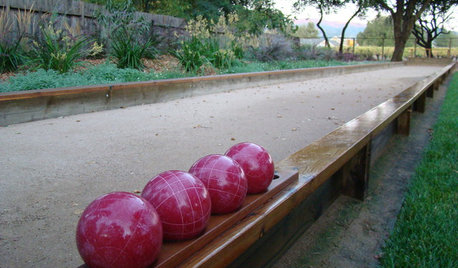Local Article about ISAT scores
FlowergirlDeb2
21 years ago
Related Stories

COMMUNITYNeighborhood Walkability: Get the Score
Hoofing it around is way easier when everything is near your house — and one tool tells you how walkable an area is before you move
Full Story
BUDGET DECORATINGPop Culture Watch: Get a Good Rap With Thrift Store Scores
Eight rooms that rock secondhand finds, in an ideabook inspired by rappers taking YouTube by storm
Full Story
5 London Homes That Score Major Design Points
With an undulating wall, a backsplash the color of a child's eyes and more, these spaces rate high in creative, evocative design
Full Story
GREAT HOME PROJECTSWhat to Know About Adding a Backyard Bocce Ball Court
A regulation court in a relaxed setting helps you get the most from the Italian pastime. Here's what it takes to build one at home
Full Story
GREEN BUILDINGWhat's LEED All About, Anyway?
If you're looking for a sustainable, energy-efficient home, look into LEED certification. Learn about the program and its rating system here
Full Story
GREAT HOME PROJECTSWhat to Know About Adding a Reclaimed-Wood Wall
Here’s advice on where to put it, how to find and select wood, what it might cost and how to get it done
Full Story
COLORYou Said It: ‘Adding Color Is About So Much More Than Shock’ and More
Highlights from the week include color advice, Houzzers helping Houzzers and architecture students building community housing
Full Story
DIY PROJECTSHow to Fix Up a Thrifted Lamp
Save money and earn DIY cred by rewiring and snazzing up a damaged lamp you scored on the cheap
Full Story
DIY PROJECTSUpcycle Furniture Finds With Paint
There are products out there designed to help you transform your thrift-store scores
Full Story
DECORATING GUIDESGet the Scoop on Finding the Best Paint for Your Money
Scoring the best deal on paint for your home may have nothing to do with advertised specials
Full StorySponsored
More Discussions



Stephanie_in_TN
sheilajoyce_gw
Related Discussions
Local produce vs. Imported
Q
What is a good H.E.R.S. Score?
Q
Article about one family's subprime disaster
Q
Portfolios-Your local designers versus magazines
Q
Mommabear
Stephanie_in_TN
duckie
FlowergirlDeb2Original Author
duckie
sheilajoyce_gw
FlowergirlDeb2Original Author
FlowergirlDeb2Original Author
duckie
Mommabear
Stephanie_in_TN
FlowergirlDeb2Original Author
FlowergirlDeb2Original Author
Stephanie_in_TN
duckie
FlowergirlDeb2Original Author
duckie
Mommabear
FlowergirlDeb2Original Author
duckie
FlowergirlDeb2Original Author
duckie
FlowergirlDeb2Original Author
sadiesmom
FlowergirlDeb2Original Author
sadiesmom
FlowergirlDeb2Original Author
Stephanie_in_TN